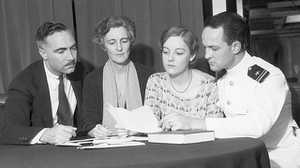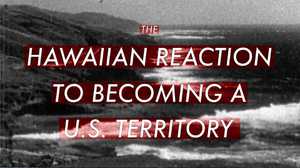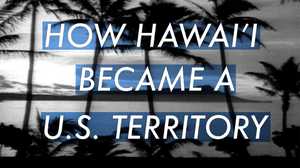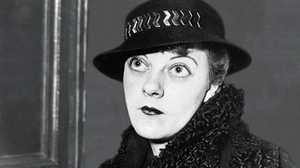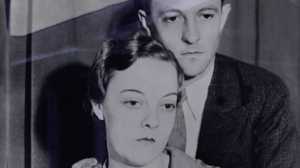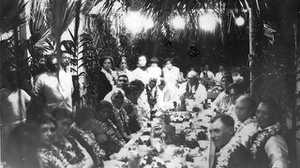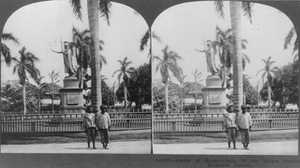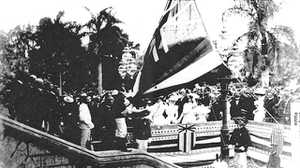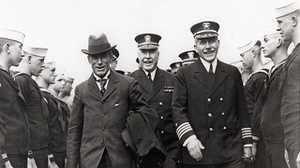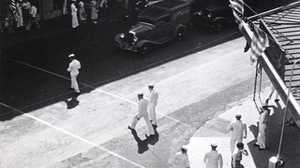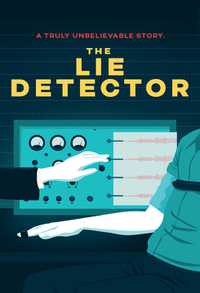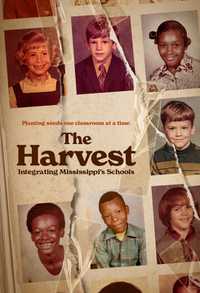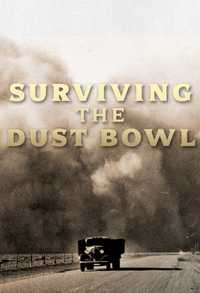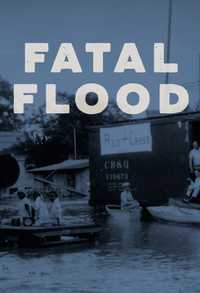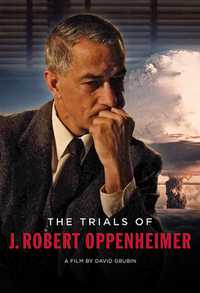NARRATOR: In the waning days of summer 1931, the false calm of Honolulu, Hawai'i, was shattered by a single allegation made by a 20-year-old Navy wife.
DAVID STANNARD, Author, "Honor Killing": She says she was kidnapped. She was taken to this area down on Ala Moana, dragged in and raped six or seven times. This is a total shock, because in the entire history of Hawai'i, as far as anybody has been able to find out, no Hawaiian individually ever assaulted a white woman before. And here was a gang of them supposedly doing it.
COBEY BLACK, Writer: Creating this story caused not only the disruption of the community like no other except Pearl Harbor, but also the death of an innocent young man.
NARRATOR: The quiet whisper of the initial lie grew to a clangorous din of power politics and racism an ugly noise that resounded through this placid-looking tropical community and then to the marbled echo-chambers of the White House, the War Department, and the United States Senate. The story of the Navy wife and her alleged assailants jumped from the local Hawaiian newspapers to front pages across the United States, fetching the attention of President Herbert Hoover, media baron William Randolph Hearst, and the country's first celebrity attorney, Clarence Darrow. The proceedings were watched by everyone from the social-register elite in New York, Washington and San Francisco to the working class in Honolulu's low-rent districts. For anybody who saw it plain, the case revealed cold, hard truths about America...and the people who ruled it.
NARRATOR: It was already a beautiful escape, this Island city in the middle of the Pacific. Two thousand miles from the California coast, it was America...but with better weather! And it was run by white people, or haoles, as the natives called them. In the summer of 1931, wealthy tourists were gliding into Honolulu Harbor and then on to Waikiki Beach, where the beautiful young Hawaiians stood ready to serve.
KANALU YOUNG, Historian: If you need an umbrella pitched and speared into the sand, or if you need a cool drink, or if you need to get surfboard lessons or ride a canoe...anything that you need to do that involves frolicking, the Beach Boys are there to satisfy. And it's said that they certainly did satisfy.
NARRATOR: Keeping the tourists satisfied was a job that paid, but there was only so much beach. So most of the working class kept to their own neighborhoods. Beyond pool halls and barefoot football there was little to do in those places. Young men could scratch up a depression-era job at the nearby docks, or in construction, or at the Dole pineapple cannery; the lucky ones might even pluck one of the plum spots at the police or parks departments, but more and more, those spoils were going to newly-arrived haoles. So most young men in neighborhoods like Kalihi, Palama and Iwilei were at loose ends.
DAVID STANNARD: These were desperately, desperately poor places. The streets were so narrow you couldn't get a car into them. They were also where the casual prostitution was so on payday, they were filled with sailors and soldiers who were crawling around looking for a little action. This was the community that these guys grew up in. Without jobs, with a lot of resentment for the military who they saw around them all the time.
HAUNANI-KAY TRASK, Writer: There was a real strong sense of racism coming at us from the military. They were almost entirely haole young men. And a lot of them were Southern. So they had this idea that Hawaiians shouldn't be out and about, having a government, having a good time in Honolulu.
NARRATOR: Dark-skinned men frolicking in public with white women was too much for many soldiers and sailors. And the military men knew when they were being made fun of by the beach crowd at Waikiki. But locals didn't push too far; there were simply too many servicemen for safety.
In 1931, there were 20,000 in the Islands...and more were on the way. Any Saturday night Honolulu's streets, speakeasies and restaurants were crawling with off-duty soldiers and sailors. On September 12, 1931, a Kentucky-born Annapolis graduate named Thomas Massie and his 20-year-old wife, Thalia, were among the Navy crowd at a Honolulu nightspot called the Ala Wai Inn. The Lt. had insisted they go, and she was not happy to be there.
COBEY BLACK: She was from a privileged family and I think she felt she was perhaps slightly socially superior and didn't like to mix too much with the Navy crowd.
DAVID STANNARD: Other people in the military would complain that she would go to parties, with Tommy, they would fight. She would bite him, throw things, and then storm out into the night. He had told her recently that he wanted a divorce. She was terribly upset about the possibility of the divorce and so she had agreed to a compromise. He would put her on probation and if she didn't behave properly, then she would go home to her parents. She didn't want to go to that dance, um, but she agreed to try to keep their marriage together.
COBEY BLACK: That night she wandered from room to room and wasn't always welcomed. In fact, there was an incident in which one of the Naval officers told her she wasn't popular. And she slapped him. And she walked out into the night before the party was over. She walked in an area that had a rather unsavory reputation. And, um, somebody did see her. And two people said that she was being followed by a haoleman.
DAVID STANNARD: Tommy, meanwhile, pretty much didn't notice that she was even gone. This was something she did all the time. So he didn't pay much attention to it until 1 o'clock when everybody was finally breaking up and he decided to make a phone call to her at home, just see if she's there. And she was not there.
NARRATOR: It was nearly two o'clock in the morning, and nearly two hours after she'd stormed out of the Ala Wai, when Tommie finally got her on the phone. She was hysterical and begged him to hurry home. And when he arrived, she told him she'd been assaulted. Over her objections, Thomas Massie called the police. When the first patrolmen arrived, Thalia Massie was visibly drunk, and she'd been badly beaten: her lip was busted, her jaw swollen. She told officers that shortly after she'd walked out of the Ala Wai she'd been hauled into a car, driven down Ala Moana Boulevard, beaten, dragged into the brush, and raped by four or five men.
DAVID STANNARD: They say, "Would you be able to recognize them?" She said, "Absolutely not. It was pitch dark." She said, "I could not recognize them if I saw them again." They said, "Could you describe the car?" She said, "No, it was, again, too dark."
COBEY BLACK: She couldn't decide who, what nationality the boys were; she thought they were Hawaiians. She said no recollection of the license plate, or what the vehicle looked like except that she said it had a flapping top.
NARRATOR: As Thalia was making her initial statements, another report was making its way through police headquarters. Shortly after midnight, an Hawaiian woman and her haole husband had had a near-collision with a carload of young men. In the argument that followed, one of the men had slapped the woman. When she'd called to report the incident, she gave police the license plate number of the car. Chief of Detectives John McIntosh reckoned that these were the same young men who had assaulted Mrs. Massie. Within twelve hours, police had rounded up five suspects, all from the Kalihi-Palama area: the driver Horace Ida, and David Takai were from Japanese families, Henry Chang was Hawaiian Chinese, and Ben Ahakuelo and Joseph Kahahawai were Hawaiians. The five young men were no angels. They'd all been drinking the night of September 12, and the hot-tempered Joe Kahahawai had, in fact, cuffed the Hawaiian woman who made the complaint. But now they were in real peril, because by the time police began questioning the five young men, Thalia
Massie was claiming she knew the license plate number of her assailant's car...and it nearly matched Horace Ida's. Didn't matter that the car Ida was driving had no flapping top, or that Thalia's doctors knew her vision was so bad she could barely see in the light of day. By then, Mrs. Massie's ugly story had gone all the way up the line to the Commandant of the 14th Naval District, Admiral Yates Stirling and there was no turning back.
COBEY BLACK: Admiral Stirling was just indignant, in fact, wrathful at what had happened and believed her story completely.
AH QUON MCELRATH: He felt that there was white womanhood which was at stake and that anyone who tampered with it, who destroyed it, should probably be destroyed themselves.
DAVID STANNARD: The word is already out that these guys have been caught. They, they don't care whether these are the right guys or not. His first reaction, as he wrote himself, was that we should string them up, string them up on trees. The first newspaper stories do not name Thalia. But she is characterized in the first breaking stories in the Advertiser and the Star Bulletin almost word for word as a white woman of culture and refinement. They are described in a subhead as fiends. And then subsequently as gangsters, uh this and that, with criminal records. Their mug shots, uh, are put up quickly into the newspapers and again and again their addresses are also, are also printed.
KANALU YOUNG: They were demonized. They were treated as if there was nothing redeemably good about any of them.
NARRATOR: With the Navy breathing down his neck, Chief of Detectives McIntosh was much relieved to have plausible suspects, and he had no interest in listening to the patrolmen who were uncomfortable with Mrs. Massie's strange and sudden retrieval of memory...or those suspicious of the haole man seen following Thalia and the drunken Navy Lt. found wandering a few blocks from the Massie home as she was making her first report. And McIntosh showed little interest in the patrolmen who knew that officers had fed the Massies the license plate number of the suspect car.
DAVID STANNARD: McIntosh and a few of his supporters, essentially tried to frame the five men that they had arrested, running them through pseudo line-ups that didn't include anybody except the suspects themselves and telling Thalia Massie in advance that these are the suspects.
COBEY BLACK: I mean this is police procedure that's not only outdated, it's not even proper. They took the car down for example and tried to trace the tire marks and completely obliterated any that were there, they drove the car around so much.
DAVID STANNARD: There was a very, very strong split in the department. A lot of detectives who were themselves Hawaiian, they began leaking information that was contrary to the prosecution to sympathetic newspapers and specifically to the attorneys who had been hired to represent these five young men.
NARRATOR: Thalia's name had been kept out of the papers, but there was plenty of talk around town about her drinking, her wild behavior, her extramarital affairs. Fortunately for Thalia, her mother had arrived from New York. And Grace Hubbard Bell Fortescue didn't intend to stand by and watch her family's good name dragged through the mud, because in 1931, her reputation was about all Grace Fortescue had left.
DAVID STANNARD: Grace Fortescue had come from a family of great wealth and great power and great social respectability. Alexander Graham Bell was her uncle. Her father, Charles Bell was a millionaire banker. Hubbard, the other side of the family, was the first president of Bell Telephone, founder of the National Geographic Society. She had thought she was marrying into the same thing and she was not. Her husband, Roly Fortescue, had squandered what was a reasonable inheritance and then refused to work, believing he was going to get another enormous inheritance at some point and he would just wait for it. She had very little money. They were living literally hand to mouth. Grace actually wound up teaching bridge to neighbors and friends as a way to raise money. At one point, she rented an apartment and the guy had to ask her to leave because she wasn't paying the rent. But she continued to maintain this face that she was a Hubbard. She was a Bell.
NARRATOR: Where Thalia was involved, maintaining the family reputation had always been a chore for Grace. Her eldest daughter was ungovernable, hungry for attention, and lacking in discretion. Earlier that summer, Thalia had unburdened herself to a University of Hawai'i psychologist who was making a study of sex and marriage.
DAVID STANNARD: He gave her a battery of tests. They ask for you to write out your thoughts in long hand. Thalia poured out her thoughts about her hateful marriage, gave them to the psychologist, he filed them and then he counseled her, two counseling sessions. He then called her husband Tommy and said, "This is beyond my competence. She needs serious psychiatric help and I really urge you to get it."
COBEY BLACK: Thalia was a very sensitive young woman and had a vivid imagination, I think. And, um, perhaps even delusions that were seriously psychopathic.
NARRATOR: Her sensational allegations had made Thalia the center of attention, and she seemed to revel in it. When the trial opened in November of 1931, her testimony was graphic, and riveting. She identified her assailants by name, and lied about having been impregnated...but there was little if any evidence to corroborate her story. Physicians who examined Thalia found no evidence of rape; independent witnesses had seen the five defendants miles from Ala Moana when the attack was alleged to have occurred. The jury didn't know which side to believe, and couldn't agree on a verdict. The judge was forced to declare a mistrial and to set the defendants free pending re-trial. When Admiral Yates Stirling heard the news he was apoplectic. The way he saw it, the mistrial was a public shaming of a Naval officer and his wife. And the Admiral meant to do something about it.
KANALU YOUNG: Stirling was like most military officers. This was a tour of duty. This was a place where you were assigned to do a job. And the interests of the U.S. in the Pacific were your primary, often sole objective. So there was no real regard on his part through his military role for the civilian population.
DAVID STANNARD: Yates Stirling has utter contempt for people of color. He bragged in his, um, autobiography about the mass killing they did when they were in the Philippines. Um, he was a white supremacist. He had contempt for the idea, as he put it, that people became American citizens, whatever their color just because they happened to be born in Hawai'i.
NARRATOR: Of the 370,000 people living in Hawai'i in 1931, only twenty percent were Stirling's white brethren. More than half descended from the thousands of Asians the haole elite had imported to work cheap. The Japanese population alone was 150,000 and growing...and that was the Navy's real concern. An expansionist Japan was beginning to look like a serious threat to U.S. interests in the Pacific. War planners recognized that maintaining control of Hawai'i was key to maintaining power in the entire region...and maintaining control in the Islands fell to Admiral Stirling. So he pushed hard for a new trial and a conviction in the Massie case. "Quick action...was necessary," wrote the Admiral, "...if the prestige of the whites in Hawai'i was to be preserved."
As prosecutor's prepared for a second trial, Hawaiian Princess Abigail Kawananakoa asked the entire community to put its faith in the American system of justice. "Guilt or innocence," she said, "must be determined by due process of law." Still, many in Hawai'i found it hard to trust in any system devised and run by haoles.
AH QUON MCELRATH: Let's face it, we were all given the basic lessons in history that the U.S. Constitution guarantees that you will have these freedoms. And it was augmented by the addition of the Bill of Rights. And, we're not dummies after all. We could see that we did not, in fact, have all of the rights that were supposed to be due us.
NARRATOR: Though the haoles who ruled Hawai'i in 1931 fancied one another fair-minded, paternalistic and generous, it wasn't generosity that had assured them lives of colonial luxury and near complete social control. The first white Americans to settle in the Islands arrived in the 1820s intent on Christianizing aboriginal Hawaiians; they soon decided it was the Lord's will that they husband the Hawaiian lands to profitability. The haoles convinced the Hawaiian monarch to introduce private land ownership, then took the best for themselves, turning much of it to the cash crop of sugar. They built their fortunes on the backs of cheap labor, with government assistance. In return for the right to export sugar to the U.S. without tariffs, they gave the States a military base in the Islands. In 1893, with the help of the United States Marines, Sanford B. Dole and other haole planters overthrew Hawai'i's Queen, ended the decades-old democratic constitutional monarchy, established the new Republic of Hawai'i and, five years later, convinced Congress to annex the Islands, making Hawai'i a U.S. Territory.
KANALU YOUNG: When the flag of the Hawaiian people, Hawaiian nation came down in 1898, there was an amazing wailing. It was Hawaiian people expressing in a Hawaiian way their disfavor for what has happened because they had done everything in their power not to become annexed, not to become a part of the United States of America. And failing all of that, they reverted right back to tradition to express for the last time an emotional side of that political choice which was the Lamentation Chant, the auwe...
HAUNANI-KAY TRASK: They come as missionaries as we say, tell Hawaiians to look up in the sky to God while they're taking all of our land. At the overthrow and annexation, they took, you know, hundreds of thousands of acres of our public lands. They called them ceded lands, which they weren't really ceded. They were stolen. Those were all the government lands of the kingdom. So, we were not only afraid of haoles. We didn't like them...
NARRATOR: How native Hawaiians saw their history was of little consequence to Stirling, and how they felt was of none. In the wake of the Massie mistrial, the Admiral's chief concern was the pride and prestige of the U.S. Navy. When a group of sailors grabbed Horace Ida and tried to force a confession by whipping him with belt buckles, Stirling was philosophical. I was surprised that Ida came off with nothing worse than a severe beating. Honolulu detectives asked Stirling to help them identify the men who had beaten Ida, but he stonewalled. The Admiral then embarked on a stunning offensive: in an official report that landed in the U.S. Congress, Stirling made a series of wildly false charges: non-white jurors refused to convict their own, he claimed. The mixed-race Hawaiian legislature lacked proper control. Gangsters ran rampant in Honolulu. Sex crimes went unpunished. White women lived under a constant threat.
DAVID STANNARD: Admiral Stirling filed a report that said there had been 40 rapes in Honolulu in the past year. There had not been 40 rapes in Honolulu. But that became the chant. That became the number that was used in newspapers and in radio broadcasts, news broadcast and so on, all over the country. The haole elite in Hawai'i are stunned. Everything is falling apart here. They were dependent on tourism. They were dependent on sugar exports and all the details that are involved with dealing with Congress on that which is a lot of Southerners were unhappy with the racial situation in Hawai'i and now are outraged at the racial situation in Hawai'i.
LAWRENCE JUDD: The march of progress is again in evidence this morning. In the establishment...
NARRATOR: Minimizing the damage fell to Territorial Governor Lawrence Judd. A scion of one of the oldest missionary families in Hawai'i, Judd had been appointed by President Herbert Hoover, at the recommendation of the haole business leaders...who counted on him to keep both government and commerce running smoothly. The Governor made public promises to clean house at the Honolulu police department and prosecutor's office, but it wasn't near enough for Navy brass. From Washington, the Chief of Naval Operations issued a double-barrel threat: first that the Navy would cancel shore leave during the upcoming Fleet maneuvers, costing Honolulu businessmen millions...and second, that Navy men would be within their rights to exact revenge on Mrs. Massie's assailants. The local chamber of commerce fell in line in a hurry, offering a five thousand dollar reward for help in convicting Thalia's alleged attackers. But the prosecutor's office was unable to turn up anything new.
DAVID STANNARD: They figured the only way that they're going to get new evidence is to get one of the defendants to confess and turn state's evidence against the others. They took Ben Ahakuelo aside and said, "Ben look, if you will turn state's evidence, we can essentially give you a free ride out of here and you'll collect the $5,000." He says, "Absolutely not. We did not do it."
NARRATOR: New Year's 1932, two months after the mistrial, a retrial was still not on the court docket. Some of Tommie Massie's fellow officers wondered why the lieutenant hadn't avenged his wife; the longer he waited, the more people in Honolulu chattered about Thalia Massie and her lack of character. Grace Fortescue, for one, couldn't stand it any longer.
DAVID STANNARD: By January 8th, she is decided that the only way to satisfactorily save her daughter's reputation and get a conviction in a second trial is to get a confession out of one of these people. So Grace Fortescue devises a plan.
NARRATOR: Grace ran the show, with help from Tommie and two sailors he recruited: Albert Jones and Edward Lord. She stalked the five defendants, learned they had to report to a bail officer at the courthouse...and in front of the judiciary building, in broad daylight, they forced Joseph Kahahawai into a rented limousine.
COBEY BLACK: They uh, took him up to Mrs. Fortescue's home in Manoa Valley and sat him down and questioned him and threatened him and said, "You'll get the same treatment that we gave Horace Ida."
DAVID STANNARD: They have him under threat of a gun. And they demand that he confess. At a certain point, one of them pulled the trigger and shot Joseph Kahahawai dead. It was a single bullet to his lung and he bled to death.
COBEY BLACK: They made no effort to save him. They wrapped him in a sheet and put him in the touring car and, uh, in which they had abducted him, and they, uh, took him out toward the Blow Hole with the intention of throwing him overboard.
DAVID STANNARD: If they can dump the body off the cliff there, it'll smash on the rocks and essentially disappear into the ocean. In the meantime, however, the police have picked up the word that there's been a kidnapping and they're on the lookout for this car. What Mrs. Fortescue has done to prevent anybody from seeing the body in the backseat is that she's pulled down the shades in the car, which becomes a key to there's something wrong with that car. One of the policemen out on his motorcycle has a description of the car, sees that car and he gives chase. Others join the chase and eventually they drive the car off the road and discover Joseph Kahahawai's body in the backseat.
COBEY BLACK: Grace stepped out of the car as though she were stepping into a ballroom. She had absolutely no conscience about what had happened. And, in her heart, felt she was totally justified, in I guess, in lynching her daughter's assailant.
NARRATOR: At the scene of her arrest, and later at police headquarters, Grace refused to answer questions. Thalia was not so discreet: "I'm sorry this man has been shot," she told reporters, "but it was no more than he deserved." Within hours of the arrest, news of Kahahawai's murder was hitting the mainland. Editors recognized it right away: this was a story that would sell millions. Crime, race, sex, politics. Rich society dame standing up to her daughter's assailants...Didn't even have to be accurate. Their readers knew nothing of Hawai'i.
DAVID STANNARD: Although the newspapers, routinely, all over the country, described the killing of Kahahawai as a lynching, they then proceeded in the text of their articles, to justify the lynching. A woman's honor was at stake and what a husband does in defense of his wife's honor, even if it involves murder, is justified. And that became the drumbeat throughout the country, on the radio, in the newspapers, in magazines.
NARRATOR: Telegrams of support came from Grace's well-connected circle of friends: the daughters of Congressmen, socialite families in New York, Washington and Philadelphia and powerful press barons like Joe Patterson, whose New York Daily News called Hawai'i a "melting pot peril." Grace's family conferred with friends and classmates in the U.S. Congress and the War Department. And the people's representatives took heed of Grace's powerful allies, Hearst headlines and Navy officialdom. They threatened to put Hawai'i under martial law, or hand it over to the U.S. military...to guard against the race riots they believed to be brewing in Honolulu.
In Kalihi, Palama and Iwilei, meanwhile, people were simply preparing to bury the dead.
HAUNANI-KAY TRASK: The grief was so overwhelming that the thought of more violence was the last thing anybody would think of, at least not from the Hawaiian people. They were overcome with grief.
KAY NAPOLEON: I went to the church. My husband and I both went. The chapel was filled. A lot of people outside too. People I know that knew Kahahawai cried, lots of them felt very sad.
HAUNANI-KAY TRASK: Thousands of people go to the funeral, which is at the Catholic cathedral, that's where the service is, and they wail. There's actually wailing there at the funeral. Then the cortege goes to the graveyard. And there's more wailing. Joe's father says that he has asked his son, "Did you do it?" And Joe said "No I didn't do it." So, his father believes him. And Joe's father says that to everyone. He says, "He swears it on a bible," that his son swore it on a bible. And as a Catholic, that's something. I'm certain that people thought that nothing was going to come of the death of Kahahawai. They were not going to be punished, the murderers. They were not going to be brought to justice. We haven't had any justice in over one hundred years. And I don't think anybody really thought there would be justice at all.
NARRATOR: Grace Fortescue, Tommie Massie and the two sailors were remanded to Navy custody, and held in safety on the U.S.S. Alton. Mrs. Fortescue took over the ship captain's quarters, with stewards at the ready to make her tea and bring the newspapers. And she could tell from the press: much of the nation had turned its attention to the case of the Territory of Hawai'i versus Fortescue, et al.
DAVID STANNARD: All the big newspapers sent correspondents, including the New York Times. They send a Pulitzer prize winning correspondent named Russell Owen. Owen comes to town and the seas part for him -- he's the New York Times. And Grace Fortescue openly tells him everything that happened. She refers to the events as "the murder." She blithely just assumes that somehow she'll be taken care of. She can actually admit to being a murderer and everything will be all right.
COBEY BLACK: He asked her, do you have any regrets about what happened. And she said, yes, I do have one, I'm so sorry we pulled the blinds down on the car that we were taking Kahahawai out to Koko Head in. That was, and he looked at her in utter astonishment, and he said, no other regrets? No other regrets.
DAVID STANNARD: Years later, he says, what I didn't report in that interview was that she said to me, "You know, I originally come from the South and where I come from, we have a way of dealing with niggers and that's what this was all about."
COBEY BLACK: Grace had powerful friends on the East coast, many prominent people who wanted very much that she got the very best defense lawyer and so they pooled their resources and were able to lure Clarence Darrow to take the case. He was then, you know, the great mouthpiece, the great lawyer of America.
NARRATOR: Defending lynchers was not the way Clarence Darrow had made his name; he was the enlightened defender of the disenfranchised, the abused, of educator John Scopes, who made bold to teach evolution in the Tennessee schools...it made no sense to Darrow's friends, his defending Grace Fortescue. What his friends didn't know, was that the market crash had wiped out his retirement money; the $30,000 fee was too enticing.
DAVID STANNARD: He says later on, "There were a couple of reasons. One, I needed the money. Two, I had never been to Hawai'i and I always wanted to go." So he took the case.
AH QUON MCELRATH: People here followed it as though it were a soap opera. And so I figured why maybe he's a damn good lawyer and he may get these people off even though they are guilty of, of the crime.
NEWSREEL: Mrs. Fortescue and Lt. Massie arrive for the trial. The defendants are accused of murder of the murder of a native who brutally attacked the wife of Lt. Massie.
NARRATOR: In the courtroom, Darrow was counting on his ability to sway the jury, so jury selection was crucial. But as much as he wanted to, Darrow found it impossible to pack the jury with haoles.
KAY NAPOLEON: So one of the questions I remember him asking, he said to my husband, "Walter Napoleon, what nationality are you?" And my husband said, "My father was French Tahitian Corsican Hawaiian. And my mother is Scotch Irish English Hawaiian." And then Clarence Darrow said, "What does that make you?" And so my husband, he said, "Well that makes me the League of Nations."
NEWSREEL: The mottled jury was made up of three Chinese, a German, five Americans, one Hawaiian, a Portuguese and a Dane...these men held the fate of four Americans...The rival pose. Prosecutor Kelly named Hawai'i's greatest legal mind, and Clarence Darrow. Friendly enemies.
NARRATOR: Honolulu's new prosecutor John C. Kelly was the hard-headed son of a Montana miner who meant to see justice done. Kelly laid out for the jury an airtight case, and Darrow made no effort to refute the evidence against his clients. First he suggested that Thomas Massie had shot Kahahawai in a fit of temporary insanity, caused by overexcited glands and unfortunate secretions in the blood. But Darrow could tell he was getting little traction in the jury box, so he switched gears...and his own defense began to echo the mainland newspapers.
DAVID STANNARD: In the law, there's a term called jury nullification. Darrow was a master at that, at asking juries to be bigger than the law, to go to higher authority. And that higher law was what Darrow called the unwritten law, the right of a man to kill somebody who has offended his wife in an egregious way.
AH QUON MCELRATH: Of course, jurors would say, my God, if my wife or if my daughter were, were given this kind of treatment by five men, they deserve what they get. And I'm sure that was part of it.
NARRATOR: Darrow's defense depended almost entirely on engineering sympathy for Thalia Massie and her family, so Thalia's testimony was his best hope...it was also a series of lies: that she was certain of the identity of her attackers, that Joe Kahahawai was among them...that it was Kahahawai who punched her in the face.
COBEY BLACK: She didn't seem to have much conscience about it. I think she always believed, you know, that if she hadn't been physically violated, that her reputation had been violated and she felt justified.
NARRATOR: While preparing the case, John Kelly had got hold of the psychological test Thalia had taken a year earlier; it revealed her to be a disturbed young woman in a marriage turning uglier by the day...during cross-examination, he stuck it right under her nose.
COBEY BLACK: She suddenly, from this innocent young woman, turned into a woman of fury and she grabbed the paper and tore it up, threw it up in the air and said, "Tommy don't let them think I didn't love you. I've always loved you and rushed from the stand down into her husband's arms." And as she rushed by Jack Kelly he said, "At last you've shown yourselves in your true colors."
NARRATOR: Darrow later said he went limp watching his star witness crack under cross-examination; he wrapped up his defense in a hurry, anxious to prepare his closing argument, which was scheduled for broadcast, live, on radio, throughout the United States.
DAVID STANNARD: Darrow's final argument was typical Clarence Darrow. It was extensive. Uh, it was bombastic. It brought people, including Darrow, to tears. Uh, it uh, it ignored the law and urged the jury to ignore the law and say there is this higher law. Kelly says to the jury, "If you don't convict these people, you are saying lynching is alright. He says, "Don't listen to the admiral. The hell with the admirals. Uh, what we have here is a is a society that needs to be held together by the law."
NARRATOR: When the case finally went to the jury, under the watch of bailiff John C. Lane...the twelve men knew of the threat of martial law; they knew that the Honolulu police department was mounting machine guns on their patrol cars, that the national guard was on call.
KAY NAPOLEON: Every day my husband used to tell me, he just didn't know what to think. He knew they were guilty. But he said uh, to uh, to John Lane, in Hawaiian, "What should I do? How should I vote?" But John Lane said to my husband, "Let your conscience be your guide."
DAVID STANNARD: The defendants are astonished. They can't believe it. Thalia screams in the courtroom about her mother and her husband having been convicted. This was not supposed to happen.
HAUNANI-KAY TRASK: What a surprise. I think it was amazing myself because there uh was so much pressure not to convict. So much threat that there would be martial law uh and they just refused.
DAVID STANNARD: Across the country because this has now been the most-watched criminal trial in the United States, all hell breaks loose. The Hearst newspapers call for a battleship to be sent into Honolulu harbor to rescue the defendants. The racist comments escalate, uh, even more than they, and they've been very high before, uh even higher than this.
NARRATOR: "If President Hoover has a spinal column he will take Hawai'i out of the hands of half-breed politicians that have made it a cesspool and a danger spot," wrote columnist Floyd Gibbons, urged on by his boss William Randolph Hearst. "Maybe you don't want white American rule in Hawai'i. I do."
The Navy organized a boycott against any Honolulu company that employed a juror in the case, and threatened to cancel all contracts with those businesses. Prosecutor Kelly received scores of letters from around the country: "Should you have a daughter, may she be ravished by ten brutes... . you ought to be hung from a lamppost and a fire set under it." More than a hundred Congressmen signed a petition demanding that Territorial Governor Lawrence Judd pardon each of the four defendants, or else Hawai'i's self government would end.
After four days of pressure, the Governor finally caved, agreeing to reduce the sentence from ten years...to one hour.
HAUNANI-KAY TRASK: There was a rumor for years when I was growing up that he invited them into his chambers to drink champagne and celebrate the fact that he was going to commute their sentence. I don't know that that's true or false. But it tells you how we looked at it.
KAY NAPOLEON: Governor Judd did a wrong thing and commuted them. That was supposed to be their punishment, and he let them go.
AH QUON MCELRATH: It incensed the people of the Territory of Hawai'i. Four defendants who were given only a one-hour stay in the governor's office and then hied off to wherever it was that they wanted to go.
KANALU YOUNG: Ten years, sifted down to one hour. So this is what Kahahawai's life is worth, you know. Nothing more, nothing less than his accused and convicted killers spending an hour visiting with the governor, drinking tea, on a lovely afternoon in paradise.
NARRATOR: The Navy shipped Grace, Tommie and Thalia out on the first available boat to California, where the three were met with a hero's welcome. The ranking Admiral in San Francisco offered them his car and driver for as long as they were in town.
Back in Honolulu, the Territorial government hired the Pinkerton Detective Agency to get to the truth about Thalia Massie's original charge of rape.
DAVID STANNARD: They come into town with a team of detectives and they re-trace every step. They re-interview all of the witnesses. And when they're finished, they say, it is virtually impossible that these men could have committed this crime. And it is highly unlikely that any such crime was ever committed. But for the rest of their lives these surviving four men have this crime as a shadow hovering over them. They never can escape it.
KANALU YOUNG: The Kahahawai/Massie case had a long-lasting effect in the hearts and minds of people everywhere in Hawai'i. It fits into a broader context of mistrust and out and out hatred, in a way, that's initiated by the military occupation and made worse, scratched like a sore that's already infected, by what happened to Kahahawai.
NARRATOR: There were Hawaiians who believed spiritual forces in the world would take revenge on Grace Fortescue and the Massies. For those keeping score, it was a mixed result. The Massies were divorced within two years. Tommie remarried, but his Navy career stalled...and in 1940, he collapsed. Navy Doctors wrote him up: "Manic Depressive Psychosis...it is believed that this condition...has been responsible for much of his difficulties in the past." He was cashiered out of the service, missed World War II, and lived another 40 years a bitter man. In the days after the divorce, Thalia began what would become a long series of suicide attempts; she finally succeeded in 1963.
Grace Fortescue, meanwhile, made some quick money writing her Hawaiian adventure story...and then inherited her fortune from her father.
DAVID STANNARD: The one who survives happily above everybody else is Grace Fortescue who lives finally in a mansion in Palm Beach, Florida, water skiing at age 87 and not dying until she's into her 90s. She remains the person who got away with murder.

